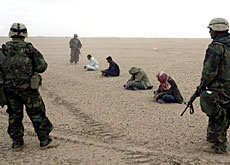ICRC fears hidden humanitarian crisis in Iraq

The Geneva-based International Committee of the Red Cross (ICRC) has warned of possible humanitarian crises outside the Iraqi cities of Baghdad and Basra.
But ICRC said on Monday it had begun visiting Iraqi prisoners of war held by United States-led forces near the southern town of Umm Qasr.
“What really worries us is what’s happening in all the cities where we’re not present, like Nassiriya, and from which we’re getting very little information,” ICRC spokesman, Florian Westphal, told swissinfo.
“The civilian population there has been more or less cut off from the outside world and nobody really knows what the impact has been on them… so that’s a reason for big concern,” he added.
Water
ICRC workers are currently present in the capital, Baghdad, as well as in the north of the country and in the southern city of Basra, where they have been struggling for days to restore the water supply.
Westphal said major concerns remained that many parts of the civilian population in Basra were still without clean drinking water.
“Part of the water network is working but it’s quite clear there are a lot of people who have been without piped water for a long time and that obviously can have catastrophic health consequences,” he said.
He added that ICRC staff in Baghdad were preparing for an eventual loss of electricity and water supplies in the capital, as United States ground troops draw closer.
Prisoners
Westphal said the ICRC hopes to gain access soon to PoWs being held by Iraq.
The ICRC said on Monday it had begun visiting Iraqi prisoners of war held by the US-led forces near the southern town of Umm Qasr.
An ICRC spokesman said that there was no word yet on when the Swiss-based humanitarian group would get access to US or British prisoners held by Iraqi forces.
Under the 1949 Geneva Conventions, which both sides have signed, the ICRC must be allowed to visit prisoners of war.
The Geneva Conventions – which outline rules of conduct during war – state that the ICRC must be allowed access to PoWs and to monitor their treatment, but there is no timeframe for when access must be granted.
US forces say they have captured over 4,500 Iraqi prisoners. It is unclear exactly how many coalition PoWs are in the hands of Saddam Hussein’s forces but US officials have said that five American soldiers and two helicopter pilots are being held.
The Pentagon says the five US soldiers were captured during an ambush of an army supply convoy near Nassiriya, lending support to the ICRC’s concerns that the city is not receiving any humanitarian or relief aid.
Looking ahead
While the ICRC struggles to cope with the immediate crisis in Iraq, many other relief agencies and organisations have already begun calculating the need and cost of aid during the post-conflict and reconstruction phases of the relief effort.
Earlier this week, the United Nations World Food Programme (WFP) cautioned that Iraq is likely to require the “biggest humanitarian operation in history” to feed its population of 27 million during the six months following the war.
Meanwhile, the UN secretary-general, Kofi Annan, hosted a meeting of relief agencies to work on an appeal for about $2 billion (SFr2.75 billion) in aid for the war-ravaged country.
Not over yet
According to Westphal, these types of discussions are by no means premature, despite the fact that the war is just over a week old and that it remains nearly impossible to get any relief supplies into the country.
“It might seem a bit far-fetched to be talking about reconstruction at the moment, but it is important that this can start as quickly as possible as soon as the conflict is over,” he told swissinfo.
“However, one shouldn’t be misled into thinking that somehow this war is already finished and that we’re already dealing with a fait accompli,” he added.
“We don’t know how long it’s going to carry on for and the actual immediate humanitarian consequences are serious and they could become a lot more serious yet.”
The director of the World Federation of UN Associations, Bruna Faidutti, agrees that equal emphasis should be placed on both the current and future needs of the Iraqi people.
She points out, however, that UN efforts are being severely hampered by ongoing security concerns.
“What is important is that the UN agencies get immediately into place, because the victims are there today… so speedy action of the UN system is a must,” she told swissinfo.
“But the war is the one that sets the rules,” she added.
swissinfo, Anna Nelson in Geneva
The International Committee of the Red Cross is worried about possible humanitarian crises in towns and villages outside Baghdad and Basra, where ICRC workers are not present.
The ICRC has succeeded in restoring water to parts of the southern city of Basra, but concerns persist that many people do not have access to clean drinking water.
The ICRC is still waiting to get access to American prisoners of war, held by Iraq.
As the immediate crisis grows, many aid agencies and governments have already begun to focus on the post-conflict and reconstruction phases of the relief efforts.

In compliance with the JTI standards
More: SWI swissinfo.ch certified by the Journalism Trust Initiative











You can find an overview of ongoing debates with our journalists here . Please join us!
If you want to start a conversation about a topic raised in this article or want to report factual errors, email us at english@swissinfo.ch.